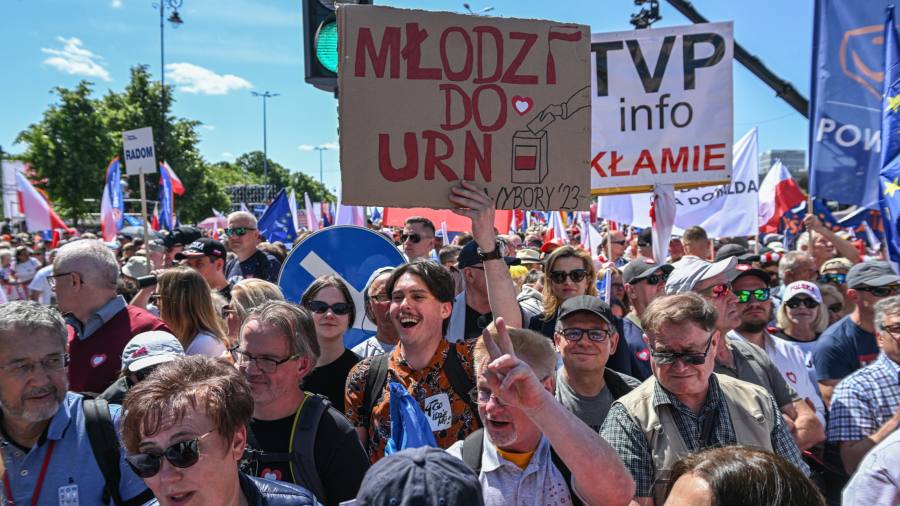Poland’s opposition led a huge pro-democracy demonstration in Warsaw on Sunday, galvanised by widespread public unease over a government-created commission that is set to investigate allegedly pro-Russian politicians and possibly ban them from office.
The leader of the main Civic Platform opposition party, Donald Tusk, addressed the crowd flanked by Lech Wałęsa, Poland’s former president and leader of the Solidarity movement that helped topple the communist regime in the 1980s.
The demonstration had been planned to celebrate the anniversary of Poland’s first post-communist election in 1989, but the turnout was boosted by the political feud over the anti-Russia commission, which President Andrzej Duda signed into a law last Monday, before swiftly backtracking and proposing various amendments for parliament to review.
Critics have dubbed the law “Lex Tusk” because its highest profile target could be Tusk, the former prime minister who is leading the centre-right’s opposition campaign to win this autumn’s fiercely contested national election.
Many protesters travelled from outside the capital to join the Warsaw rally, some on buses provided by Civic Platform. Smaller demonstrations were also held on Sunday in other Polish cities, as well as Berlin and Paris.
“We cannot thank Duda for protecting our constitution but we can at least thank him for now mobilising people and making us understand that our democracy is really in danger,” said Joanna Stankiewicz, who made the one-and-a-half hour trip to Warsaw from Łódź.
The commission was proposed by the ruling Law and Justice party, or PiS, whose founder Jarosław Kaczyński has repeatedly accused Tusk of being too friendly to Moscow. The government led by PiS claims the commission will help protect Poland against Russian meddling during the election campaign and at a time when Warsaw has sought to spearhead western support for Kyiv in its war against Moscow.
But one of Sunday’s demonstrators, engineer Piotr Jędrzejewski, said “a government that is claiming to protect us from Russia in fact wants Poland to have the same country model as Russia or Belarus”, where people can be detained and sanctioned arbitrarily for speaking against their government.
Many of the protesters waved Polish and EU flags, as well as signs mocking Kaczyński and Duda and the ruling PiS party. “Do not piss on Poland,” one poster read in English. Bartosz Arłukowicz, a Civic Platform politician, estimated that half a million people took part in the Warsaw protest, but this number was not immediately confirmed by the police or other independent sources.
While the so-called Lex Tusk has further polarised Polish society and given new momentum to the parties that oppose PiS, some of the protesters said their priority remained other issues that have divided Poland, notably access to abortion and the rights of the LGBTQ community.
Student Pola Zarudzka, who wore a pro-abortion T-shirt, said she had taken part in previous demonstrations to protect the rights of women. “What I feel is different now is that there is a bigger sense of rage about all that this government has done, and not just against women,” she said.
In his address to the crowd, Tusk suggested that the next election should be viewed by voters as being as important as that in 1989 that enshrined Poland’s return to democracy. He also drew a parallel between the fight against communism and resistance to the PiS government that came into office in 2015, when it defeated Civic Platform in an election.
Teacher Ilona Tutoj said she viewed this year’s election as more important than recent previous votes. “In terms of respect for our constitution and democracy, things have been getting worse year by year,” she said.
Read the full article here




